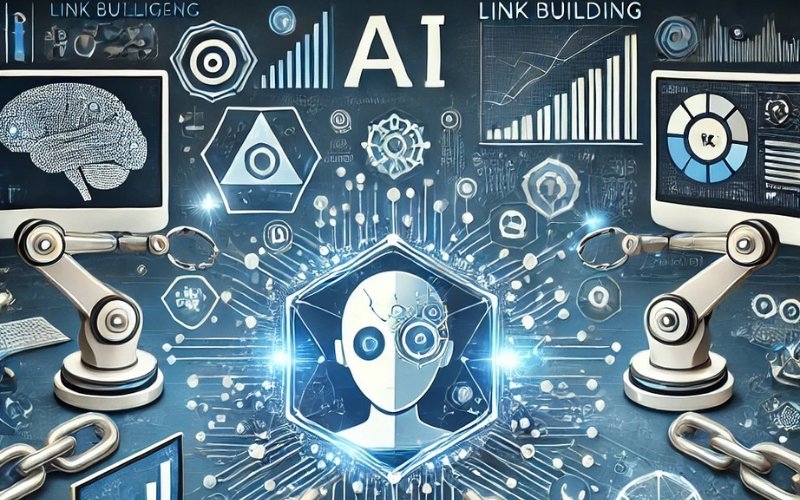Link building has long been one of the pillars of effective SEO strategies. Earning backlinks from authoritative websites can significantly boost a site’s rankings in search engine results pages (SERPs). However, the traditional methods of link building, such as manual outreach and relationship-building, can be time-consuming and resource-intensive. Enter Artificial Intelligence (AI), which has revolutionized how link building is approached by making the process smarter, faster, and more efficient.
In 2024, AI is transforming how SEO professionals build links, analyze backlinks, and enhance website authority. With AI, marketers can now harness data-driven insights, optimize their outreach strategies, and improve their overall ranking potential. Let’s explore how AI is changing the landscape of link building and how you can use it to bolster your SEO strategy.
1. Analyzing Backlink Profiles with AI: Quality Over Quantity

The quality of backlinks matters far more than quantity in today’s SEO world. In the past, websites could achieve high rankings by acquiring a large number of backlinks, regardless of their quality. But with search engines, particularly Google, becoming more sophisticated, the focus has shifted towards obtaining backlinks from reputable and relevant sources.
AI-powered tools such as Ahrefs, Moz, and SEMrush use machine learning algorithms to evaluate backlink profiles in-depth. These tools analyze factors like domain authority, page authority, relevance, and spam scores to assess the quality of a website’s backlinks. With AI, marketers can quickly determine which links are beneficial for their site and which could potentially harm their SEO efforts.
AI’s ability to process vast amounts of data in real-time allows for a more accurate analysis of a website’s backlink profile. This helps SEO professionals focus on high-quality links that will improve their site’s authority and avoid spammy or irrelevant links that could lead to penalties from search engines.
2. AI-Assisted Outreach: Finding the Right Sites for Link Building
One of the most challenging aspects of link building is identifying high-authority websites that are relevant to your niche and open to linking to your content. This process traditionally involved manually searching for prospects, analyzing their relevance, and reaching out with customized pitches. AI is now making this process much more efficient.
AI-driven tools like Pitchbox, Respona, and BuzzStream have integrated machine learning algorithms that help SEO professionals identify the best sites for outreach. These tools analyze website authority, content relevance, and the likelihood of securing a backlink. They provide a curated list of potential linking opportunities based on an analysis of both the prospect’s site and your own.
Moreover, AI can help personalize outreach emails by analyzing past successful campaigns and identifying which types of messages receive the best response rates. This reduces the manual labor involved in customizing pitches for each prospect and increases the chances of securing valuable backlinks. AI takes guesswork out of the equation, allowing marketers to focus their efforts on the most promising opportunities.
3. Competitor Analysis: Leveraging AI to Identify Missed Opportunities

Competitor analysis is a crucial component of any successful SEO strategy. By understanding where competitors are getting their backlinks, you can uncover valuable opportunities for your own site. AI-powered tools are especially useful in this area as they can scan competitor backlink profiles quickly and provide actionable insights.
For example, tools like SEMrush and Ahrefs use AI to analyze your competitors’ backlink profiles and identify patterns in their link-building efforts. These tools can show you which domains link to your competitors but not to your site, presenting potential opportunities for outreach. By replicating the successful strategies of your competitors, you can build a more authoritative backlink profile.
Additionally, AI can help identify gaps in your backlink strategy. Perhaps your competitors are earning links from high-authority industry publications or thought leaders that your site has not yet reached. AI can highlight these gaps and recommend sites that you should target to improve your site’s authority and rankings.
4. Predictive Analysis: Identifying Link-Worthy Content with AI
One of the most exciting advancements in AI for link building is its ability to predict which types of content are most likely to earn backlinks. Predictive analytics, powered by machine learning, uses data from previous campaigns, industry trends, and user engagement metrics to forecast which content will attract the most links.
AI tools like MarketMuse and Clearscope use machine learning to analyze existing content and identify topics or themes that are likely to generate a high volume of backlinks. By creating data-driven, link-worthy content, you can improve your chances of earning natural backlinks without resorting to extensive outreach campaigns.
For example, AI can analyze a successful blog post on your competitor’s website and pinpoint the specific topics or content structures that attracted the most links. It can then suggest similar content ideas for your site, helping you create articles, infographics, or research papers that are more likely to earn authoritative backlinks.
5. Automating Routine Tasks: Saving Time with AI-Powered Link Building
One of the primary benefits of using AI in link building is the automation of repetitive and time-consuming tasks. Tasks such as sending follow-up emails, monitoring outreach efforts, and tracking link-building progress can be streamlined with AI-driven tools.
For instance, tools like Hunter.io can automate the process of finding email addresses for outreach, while Pitchbox can automate follow-ups to prospects who haven’t responded. AI-driven platforms ensure that these tasks are handled efficiently, freeing up time for marketers to focus on higher-level strategy and content creation.
Automating routine link-building tasks also ensures that nothing falls through the cracks. AI tools can schedule follow-up emails at optimal times, track which outreach efforts are most effective, and generate reports on campaign performance—all without requiring constant manual input.
6. Building Authority Through Data-Driven Link Building
Building website authority is the ultimate goal of any link-building strategy. AI’s data-driven approach helps marketers build smarter link-building strategies that focus on obtaining high-quality, relevant links from authoritative sites. By leveraging AI to analyze data on competitor backlinks, content performance, and prospect engagement, marketers can make informed decisions about which links will have the greatest impact on their SEO efforts.
This data-driven approach also allows for better decision-making when it comes to link-building campaigns. Instead of pursuing links indiscriminately, AI helps prioritize opportunities that are most likely to contribute to long-term authority and improved search engine rankings.
7. Future of AI and Link Building: What to Expect

As AI technology continues to evolve, the future of link building looks even more promising. With advancements in natural language processing (NLP) and machine learning, AI will become even more effective at understanding context, identifying new link-building opportunities, and automating processes. The tools of tomorrow may offer deeper insights into backlink profiles, identify trends before they emerge, and help websites establish authority faster than ever before.
SEO professionals who adopt AI-driven link-building strategies today will be well-positioned to stay ahead of the competition as the digital landscape continues to evolve.
Conclusion
AI has revolutionized link building by making the process smarter, more efficient, and data-driven. From analyzing backlink profiles to predicting content that attracts links, AI enables SEO professionals to build high-quality, authoritative link profiles that improve rankings and visibility. By leveraging AI-powered tools for outreach, competitor analysis, and content optimization, businesses can create more effective link-building strategies that drive long-term success.
As AI continues to evolve, the future of link building will be shaped by more sophisticated algorithms, allowing marketers to stay ahead in the ever-changing world of SEO.

